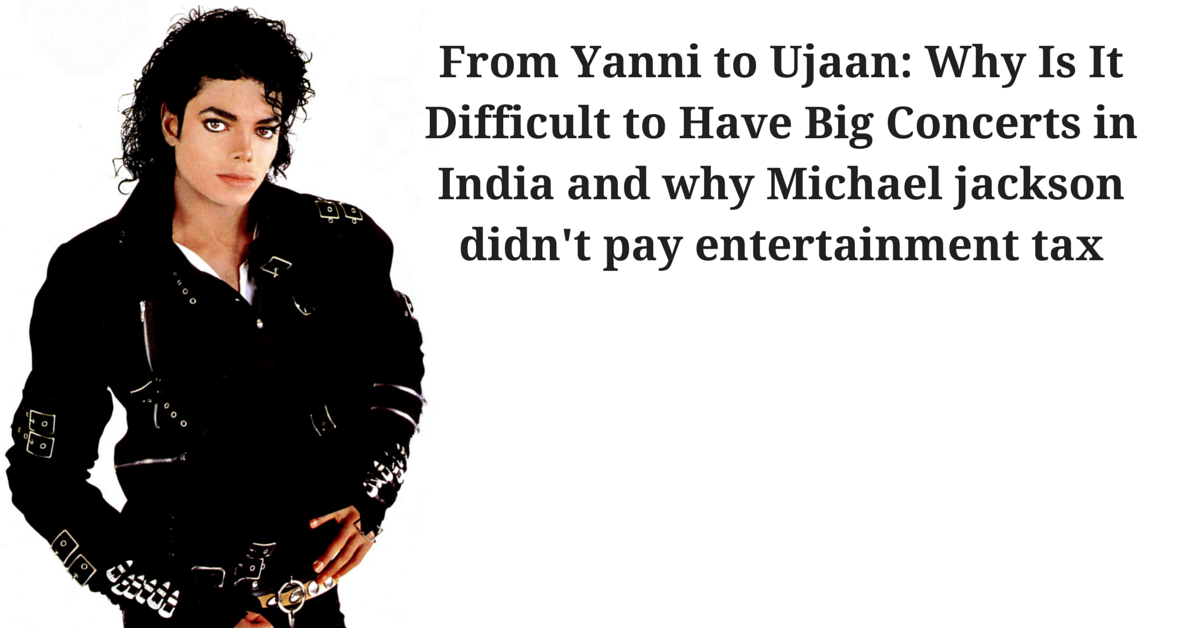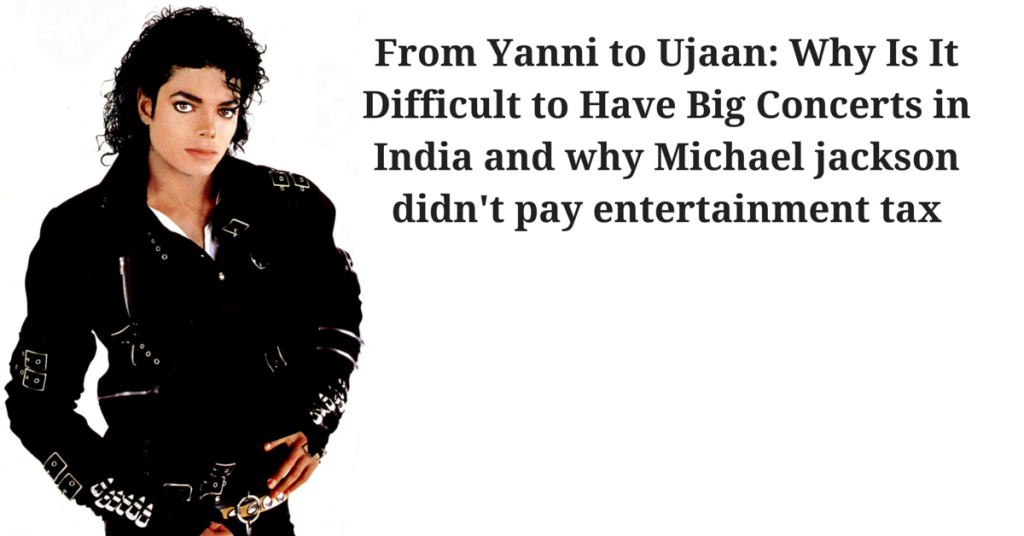We are publishing this article from archives of defunct blog A First Taste of Law. How easy or difficult is it to hold a rock concert in India? Why doesn’t bands like Coldplay perform regularly in India, a country where they have the very substantial fan following? For very long, the explanation given was that it is not profitable enough to play in India.
Well, those days are gone. Look at what the top Indian musicians earn, or for that matter the fact that Iron Maiden plays in Bangalore almost annually speaks for itself.Still, because all states in India do not have the same laws and regulation, the difficulties in organising a massive concert has varying degree from state to state. There are a wide range of laws that seek to regulate these concerts – starting from environmental and sound pollution laws, to entertainment taxation laws, administrative orders in metros that control large public gatherings and nightlife, public nuisance laws and even various police acts.
Very often the inexperience and lack of legal support on the part of organisers add to the trouble. Let’s look into the recently postponed UJaan festival to get an idea about how things play out in reality. Enters Bedavyasa Mohanty, who researched into the mystery of legal provisions that deal with large concerts.
Ujaan
The Ujaan festival, which created quite a bit of excitement in our friend circles, was intended to be a collaboration of artists, musicians and art lovers from all over the country to raise awareness about the various environmental and social issues that plague the Sunderbans delta. The festival stated its aim as to bring to the fore problems like the imminent environmental threat to the delta, the constant man-animal conflicts taking place in the region and the issue of human trafficking that haunts the residents of the area.
The organisers also aim to undertake community development projects and aid the various other organisations working in the region. The festival, which was originally supposed to take place from the 10th to the 12th of March, 2011 at Frasergunj, West Bengal, has now been indefinitely postponed due to the change in the schedule of the Madhyamik Exams in West Bengal that now conclude on March 23 instead of March 7th owing to a law that restricts loud music during exams.
PROBLEMS FACED BY THE UJAAN FESTIVAL:
The leakage of exam papers of the West Bengal Madhyamik Exams let to it ending on the 23rd of March instead of the 7th of March as had been originally planned. This change in the schedule of the exam invoked an order of the West Bengal Pollution Control Board that discourages the playing of loud music during the commencement of state board exams like Higher Secondary or Madhyamik. The Order reads:
‘In exercise of powers conferred under Air (prevention and control of pollution) Act 1981 and Environment Protection Act 1986, read with Noise Pollution (Regulation and Control) Rules 2000 and in conformity with the order passed by the Hon’ble high Court Calcutta in connection with C.0. No . 4303(W) of 1995 (Om Brighana Religious Society v. State of West Bengal and Ors.) all concerned are hereby directed not to issue any permission for use of microphones, loudspeakers, sound boxes or amplifiers, in open air functions before three days of the commencement of the Secondary, Higher Secondary and Council Examinations, till such examinations are over.’1 The aforementioned Noise Pollution (Regulation and Control) Rules, 2000, in Rule No. 5, explicitly provides that the State Government with a view of reducing noise pollution can impose restrictions on the use of loudspeakers/ public address systems and sound producing instruments, while also allowing for exemption periods during festivals. Rule 8 (1) (b) also provide that the authority has the power to prohibit ‘the carrying on in or upon, any premises of any trade, vocation or operation or process resulting in or attended with noise.’
On 3rd March, Arka Mukhopadhyay, a Kolkata-based poet and theatre practitioner wrote an open letter2 expressing concerns over the ecological implications of organising a rock concert in an environmentally fragile area like the Sunderbans. In his letter, Mukhopadhyay mentions that the festival that will involve several hundred people will be a huge burden on the ‘natural and social fabric’ of the region. The letter also criticises the intention of the organisers and their insensitivity towards the greater ecological threat that they might pose. The letter even goes so far as to call the event ‘a way of legitimizing one’s beach party in the name of a cause, at perhaps a great environmental cost to the local community and ecology.’ The author also mentions his intention of filing a PIL to obtain a stay order against the festival and encourages potential participants to refrain from attending the event.
There are, apart from the above-mentioned problems, a multitude of other problems that arise in the process of organising a concert of this magnitude. The organisers of Ujaan are visibly paranoid after the open letter by Mukhopadhyay and maintain that the letter and all subsequent controversy was a result of a ‘huge communication gap.’ Opashona Ghosh, the head of curation and publicity at Magic Wall rush Studio who is in charge of PR and Media for the event confirmed that they had obtained clearance from six different ministries to conduct the festival including the Ministry of Environment and Forests. On being asked what other legal encumbrances they had to face in the organisation of the event, she replied that they ‘did not really have to pay taxes’ but refused to make any further statement regarding the legal questions surrounding the concert. She however said that she would be in a position to answer all questions once their new website was up and running from the 15th of March and agreed to answer my questions in person but not on the phone.
The Yanni concert at the Taj Mahal
This, however, is not a singular incident and many a times concerts and big events face organisational and operational difficulties in their execution. The Case of M.C. Mehta v. Union of India3 famously known as the Yanni Concert case also arose because of the potential damage that the concert, which involved the congregation of thousands of motor vehicles and consequent release of obnoxious gasses into the air, could cause to the Taj Mahal. Although the concert had been given clearance by the Ministry of Environment, the Supreme Court directed the establishment of an independent body to look into the environmental hazards associated with the Yanni concert. The body that took into account the advanced ambient air quality monitoring system laid down guidelines for all subsequent concerts in the vicinity of the Taj Mahal.
Entertainment Tax
Apart from the environmental concerns that arise with big public events, there is also the economic consideration that needs to be kept in mind. Big commercial events like Ujaan or the Yanni concert or even commercial movies for that matter are subject to an entertainment tax under the stipulation of the Entertainment Duty Acts of the respective states or the The Delhi Entertainment and Betting Tax Act, 1996. ‘With every ticket, a certain amount of tax is tagged which is paid while buying the movie tickets and is included in the price of the tickets. The entry tickets to any cinematographic exhibitions have the entertainment tax included in it, which is 25-30 percent. The Entertainment Tax Department is a major source of revenue for the Government of India.4The Michael Jackson Concert in Bombay and ongoing litigation
The controversy relating to entertainment tax has arisen in a very recent case where a division bench of the Bombay High Court consisting of Justice D.K. Deshmukh and Justice K.K. Tated is all set to review a section of the Entertainment Duty Act in order to find out why a Michael Jackson concert at the Andheri Sports Complex on October 30, 1996 was exempted from tax duty. The matter was taken up by the court on 1st March, 2011, fifteen years after a PIL in that regard was filed by the Mumbai Grahak Panchayat. Throwing the spotlight backwards on the Shiv Sena-BJP government’s entertainment tax exemption to the 1996 Michael Jackson show, the Bombay high court observed that the blanket power given to government under the Entertainment Duty Act can be misused.5
The Bombay Entertainments Duty Act, 1923 identifies cinema theatres, open touring cinemas and even discotheques as a form of entertainment where an individual has to pay money to gain access to the entertainment. The High Court has however issued a notice to the Advocate General of Maharashtra seeking his assistance on review of Section 6(3) of the Entertainment Duty Act which gives power to the state government to exempt duty to public charitable trusts or any such events, where the payments for admission to any entertainment would be wholly devoted to ‘philanthropic or charitable purposes.’ The PIL alleges that the event manager company as well as Shiv Udyog Samiti, which is a Shiv Sena outfit, misrepresented the event as a ‘classical concert’ and obtained the exemption. The Entertainment tax, had it been levied could have made the Exchequer richer by Rs 11.60 crores.
We want to throw light on more relevant aspects of organising concerts in India. If you have any questions or perspective on this matter, please share it below in the comment. We shall be most happy to follow up this issue in future posts.
- Memo No. 143 13/WPBQ/96 (Part File) of the WEST BENGAL POLLUTION CONTROL BOARD, 3.2.2009
- Arka Mukhopadhyay, Fw: Open Letter About A Proposed Rock Concert in the Sunderbans Dist, March 3, 2011, available at: http://groups.yahoo.com/group/hrm/message/1805
- M.C. Mehta v. Union of India
- Entertainment Tax in India available at: http://business.mapsofindia.com/india-tax/entertainment.html
- Rosy Sequeira, Government can misuse Entertainment Duty Act on Wednesday, Mar 2, 2011, available at: http://www.dnaindia.com/mumbai/report_government-can-misuse-entertainment-duty-act_1514288If you enjoyed reading this post, do leave a comment!
 Serato DJ Crack 2025Serato DJ PRO Crack
Serato DJ Crack 2025Serato DJ PRO Crack









 Allow notifications
Allow notifications


